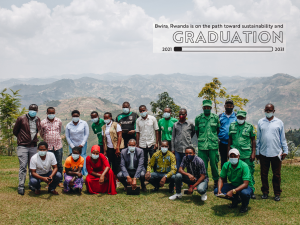Welcome to Bwira, Rwanda!
Others, Community Development , PovertyContributed by: Food for the Hungry Canada
Written by Jenny Stoecker
This year, FH Rwanda and FH Canada began a new 10-year partnership with five communities in Bwira, Rwanda.
In the first year, FH will partner with three communities, and join with the remaining two in 2022. We’re so excited to introduce to you this amazing place and hope you’ll consider joining the journey!
The Beauty of Bwira

As you get out of the city and into the hills, the one-lane dirt road to Bwira is cut with deep scars, causing those in the car to bounce and shift. On the side of the road are people pushing bicycles piled high with firewood or vegetables to sell. While the road rises higher and higher, the views of sharp green hills grow more stunning around every bend. Houses and farms, somehow holding onto the 60 degree slope, dot the hillside.
While Google Maps will tell you that Bwira is a two and half hour drive outside of Kigali (the capital city), the reality on the windy roads is closer to four. The main transport to Bwira, for those who can afford it, is motorcycle. Cars are scarce, and people tending their farms pause to look and wave as we drive by. If you were to walk the roads in the evening, the streets and houses would be dark, with the majority of the population relying on kerosene lamps for light and firewood for cooking.
Bwira’s five communities are spread out across a vast network of hills. If asked where Bwira ends, an official will point to the furthest hill that can barely be seen and say, “That peak. There is the end of Bwira.”
The Crux of Water

The lush hills of Bwira would make you think water flows in abundance. And in a sense, it does. But it flows downward along steep hills and settles into unprotected streams far below the villages. This makes it hard to get, and easily contaminated. Accessing clean water is one of the greatest challenges families in Bwira face on a daily basis. If they collect water from a slow-flowing, protected spring, it will take a family of four a minimum of two and a half hours every day to get enough to live on. So they often use closer (and dirty!) rivers, bringing home water contaminated with intestinal parasites which cause pain and sickness, and exacerbate malnutrition. Children are badly affected.
This is why Bwira’s leaders have named clean water as one of their first challenges to tackle! We’re going to support them as they dig new wells closer to home, cap more springs, and educate families on healthy hygiene and sanitation.
Cultivating the Soil

For generations, Bwira’s families have faithfully tilled the soil on their hills. They grow yams, beans, corn, eating and selling their produce to survive.
But there’s a growing problem—hunger has been steadily deepening, hurting the lives of children across the region. Why? Bwira’s beautiful hills put farms at risk of soil erosion while some farming practices are depleting the soil and pesticides are killing off the honeybees.
We’re partnering with farmers and leaders to implement lasting solutions—and fast. We’re excited to work with these experienced farmers to provide improved seeds, establish irrigation for crops, and share new techniques to fertilize the land and repel pests in a safe way. By offering farmers animal care workshops and distributing small livestock (think Gift Guide!), FH will further help develop family farms. All these efforts will soon lead to rejuvenated soil, more abundant harvests, diversified diets, and increased (and reliable!) income.
The Value of Education

Sitting in a classroom learning reading, writing, and arithmetic doesn’t make much sense to the parents in Bwira. Shouldn’t their children be learning farming and staying home to help the family survive? This (understandable) resistance to education, combined with the long distances children must walk to school; fees for school supplies, uniforms, and lunch programs; and overcrowded classrooms, make it extremely difficult for children to get very far in school.
We’re going to come alongside caregivers and parents to help them see the true value of education (for themselves, as well!) and ease the financial burdens associated with school through child sponsorship. We’ll also join hands with leaders to increase the access to and quality of basic education in Bwira.
Moving Forward, Together

While local leaders, FH Rwanda, and FH Canada see a clear need in Bwira, the decision to journey together over the next 10 years is deeper than that.
There is an openness in Bwira to grow together. The local leaders see incredible potential in their youth, who make up the majority of the population.
They have land and relatively good weather, and know that with a little support they can lower rates of malnutrition and improve livelihoods. The leaders, and we at FH, are confident that their community can flourish!
One of the best ways to join the people of Bwira on their journey out of poverty is to sponsor a child in the community. Your sponsorship will encourage a child’s development and support their family as they work together toward sustainability. Learn more about Child Sponsorship here!
Want to learn more about communities that FH works with in Rwanda? Click here!

